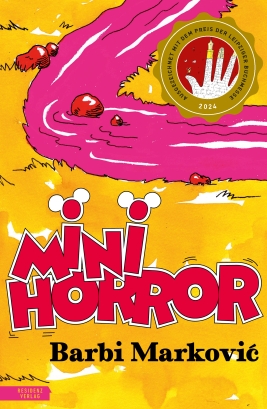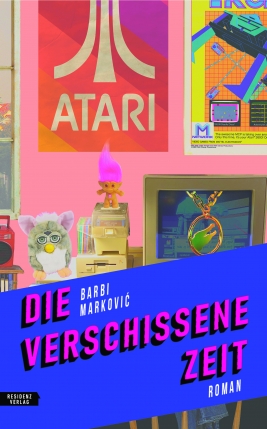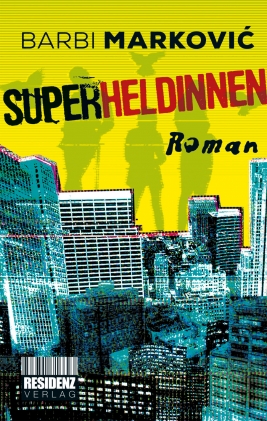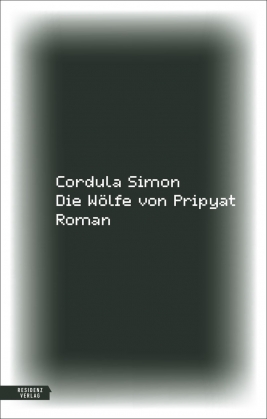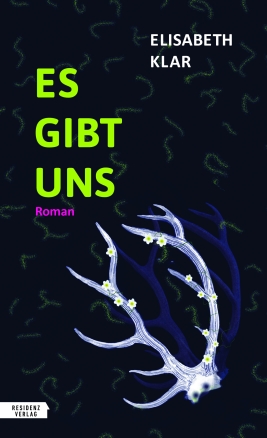Marković ist ein urkomischer Roman gelungen, der Sprache dabei wunderbar ernst nimmt. (...) Die Autorin schreibt in klaren Sätzen, die knallen. Jedes Wort sitzt, sogar die hässlichen.
[Quelle: Jolinde Hüchtker, TAZ]
Der empfundene Alltagshorror ist dem realen Mega-Horror gleichgestellt, das eine fließt ins andere, das ist Markovićs Kunst, darin liegt auch der Witz dieses Buches.
[Quelle: Christiane Lutz, SÜDDEUTSCHE ZEITUNG]
Aberwitziger Pop-Parcours
[Quelle: Sissy Rabl, DIE PRESSE]
Das Buch hat etwas Fratzenhaftes, Überdrehtes, was hier aber als Kompliment zu verstehen ist. Von Anfang an gibt es hier einen echten Funkenflug von originellen Sätzen.
[Quelle: Jörg Schieke, MDR]
Barbi Marković schreibt in ihrem Band "Minihorror" hinreißende Erzählungen über Menschenfresser, Doppelgänger und Ungeheuer. (...) Sie ist eine Meisterin der elektrisierend neuen Verwendung bekannter Genre-Elemente, vergleichbar etwa mit den Werken von George Saunders oder Karen Russell. (...) Barbi Markovićs Bücher sind für mich die weitaus bewegendste in deutscher Sprache unternommene Abenteuerfahrt in die Geheimnisse des cartoonhaften Erzählens. (...) Es ist wirklich lange her, dass ich ein Buch lesen durfte, in dem man Satz für Satz so viel Spaß beim Erleben grauenvollster Wendungen und unheimlicher Erscheinungen haben kann.
[Quelle: Clemens Setz, DIE ZEIT]
Comichafte Erzählungen über einen Alltag voller kleiner und allergrößter Katastrophen, über Internetsuperkräfte und Handysucht, Horrorfamilien, Trennungen, Paranoia und einen gewissen Entspannungsdruck im Urlaub. Kennen Sie nicht? Nein!
[Quelle: Lisa Berins, FRANKFURTER RUNDSCHAU]
Ja, bei Marković‘ Geschichten muss man eigentlich immer aufpassen, weil man weiß nie, wer oder was um die Ecke biegt. Ihre Geschichten sind skurril, witzig und definitiv nix für schwache Nerven.
[Quelle: Angelika Strobl, WOMAN]
Fehlt nur noch der Joke mit der Bananenschale in diesem Buch, das surreales und reales Pech zusammenbringt.
[Quelle: Björn Hayer, DER FREITAG]
Einem Band mit Kurzprosa den Titel „Minihorror“ zu geben ist an sich schon eine gute Idee und diese Prosa zu gestalten wie einen Comic, dessen drastische und groteske Bilder aber nur durch Sprache entstehen, eine noch bessere. (...) Wie verspielt, aber keineswegs harmlos die Poetik der 1980 in Belgrad geborenen Barbi Marković ist, zeigt sich auch noch an „Bonusmaterial“, das dann doch Ansätze zur Graphic Novel aufweist. So kurz diese (Miki- und Miniaturen) sind, erzeugen auch sie bisweilen Maxihorror.
[Quelle: Jan Wiele, FAZ]
„Minihorror“ ist ein Buch über die banale und fundamentale Verunsicherung in einer unübersichtlichen, nicht guten Welt. Und über die Wehrlosigkeit und Ignoranz des halbwegs aufgeklärten Menschen, der doch gerne das Richtige und Anständige tun will. Es geht um Empfindsamkeit und den Versuch, die Dinge so ernstzunehmen, wie sie es verdienen. Es geht um das Halbbewusstsein der eigenen Lächerlichkeit.
[Quelle: Judith von Sternburg, FRANKFURTER RUNDSCHAU]
Das Buch ist eine Kombination aus Text und Zeichnung, bedient sich verschiedener Genres, ist lustiges Taschenbuch und Märchen, fantastisch, traumhaft und auch ein bisschen gruselig, dabei aber immer humorvoll und sprachlich entwaffnend. Zu Recht hat Barbi Marković mit „Minihorror“ den Preis der Leipziger Buchmesse 2024 gewonnen.
[Quelle: Sonja Longolius, BERLINER MORGENPOST]
Barbi Marković meint es ernst. Sie nimmt es mit dem Horrorgenre auf. Allerdings mit sehr viel Begabung, mit Unterwanderung dieses Horrors zu Witz.
[Quelle: Katja Gasser, Ö1 EX LIBRIS]
Wenn man von jemandem behaupten kann, er bzw. sie habe das Ohr am Puls der Zeit, dann von Barbi Marković. Mit fast schlafwandlerischer Sicherheit haut sie alle paar Jahre ein mehr oder weniger drastisches Buch heraus, in dem wir unsere Wünsche und Sehnsüchte und Beschwernisse wiederfinden. (...) So kann man das natürlich machen, mit den Ängsten. Man erzählt sie, man bannt sie. Man macht sich über sie lustig. Man teilt sie. Man lässt sie so groß wie Monster werden und so klein wie Fruchtfliegen, spielt mit ihnen und schubst sie herum. Man kann von Barbi Marković nur lernen.
[Quelle: Bettina Steiner, DIE PRESSE]
Eigentlich ist „Minihorror“ ein unmögliches Buch. Kein Mensch kann so skurrile Geschichten erfinden und diese dann auch noch in so schrägen Sätzen. Kein Mensch außer Barbi Marković.
[Quelle: Christina Vettorazzi, DER FALTER]
Barbi Marković nimmt in ihrem neuen Buch den Horror des Alltäglichen unter die Lupe. Sie überhöht, spitzt zu und führt ad absurdum. Minihorror ist witzig und eine Empfehlung nicht nur für Fans des Horrorgenres oder der Lustigen Taschenbücher.
[Quelle: Conny Lee, FM4]
Mit „Minihorror“ liegt nun Marković erster Kurzgeschichtenband vor: Es sind kleine, schräge Horror-Storys, die das Grusel-Genre in Richtung schwarzer Humor umdeuten. Sie untermauert mit „Minihorror“ ihren Ruf als einzigartige Stimme in der österreichischen Gegenwartsliteratur.
[Quelle: Sebastian Fasthuber, DER FALTER]
Mit Riesenspaß am Gruselgenre setzt Barbi Marković in ihrem neuen Roman etliche Geschichten in die Welt, schräg, persiflierend, maßlos übertrieben – stets vergnüglich, unterhaltsam und literarisch auf eindrucksvollem Niveau.
In „Minihorror“ beweist Barbi Marković ihre große Lust am Fabulieren. Gleichzeitig zeigt sie, wie dreh- und umkehrbar Wahrheiten sein können, wenn sie in die Hände erstklassiger Autorinnen fallen, die keinerlei Interesse an irgendeiner linearen Erzählweise besitzen. (...) Barbi Marković, diese famose Sprachkünstlerin, sorgt mit „Minihorror“ endgültig für eine abwechslungsreiche Alternative zum zuweilen doch sehr monothematisch gewordenen Literaturangebot jüngerer Zeit.
[Quelle: Werner Krause, KLEINE ZEITUNG]
„Minihorror“ sollte unverzüglich erworben und gelesen werden. (...) Barbi Marković hat sich die neue Sprache von außen angeeignet, unbehelligt durch Gebrauchsspuren also. Und wie das funkelt! Ihr Werk kreist erwartbar um die Assimilationsbemühungen Zugewanderter. Aber jenseits der lästigen Lamentier- und Schuldzuweisungsroutine, sondern im Zeichen der Anarchie.
[Quelle: Heinz Sichrovsky, KRONE]
Minihorror ist ein großer literarischer Spaß.
[Quelle: Harald Gschwandtner, LITERATURHAUS]
Eine humorvolle und satirische Abrechnung mit den großen und kleinen Albträumen des alltäglichen Lebens.
[Quelle: Nathalie Schallert, NEUE VORARLBERGER TAGESZEITUNG]
In einfacher, klarer Sprache, die gelegentlich ins Rotzige ausbricht, packt Marković uns an unbequemen Stellen an, verweist auf die Bösartigkeit des Kapitalismus anhand der Boshaftigkeit unserer nächsten und der uns begegnenden Personen.
[Quelle: Suse Schröder, LOGBUCH KREUZER]
Barbi Marković schreibt Popliteratur, die witzig, cool und mitreißend über Politisches verhandelt.
[Quelle: Paula Pfoser, ORF TOPOS]
Barbi Marković sucht in ihren witzig-surrealen, tiefgründigen Geschichten den Horror des Alltags – und findet ihn. (...) Raum, Zeit und Phantasie sind in Barbi Marković‘ Geschichten keine Grenzen gesetzt. Sie jagt Mini und Miki in eine Horrorszene nach der anderen, die sie mal witzig-absurd, mal fantasyhaft, mal surreal schildert – und die gerade in dieser Surrealität besonders wahrhaft sind.
Ein wilder Ritt durch die Katastrophen des Alltags, schillernd und schimmelnd.
[Quelle: Herbert Schorn, OÖ NACHRICHTEN]
Barbi Marković legt mit „Minihorror“ abermals ein großartig-komisches Buch vor.
[Quelle: THE GAP]
Barbi Marković (...) ist seit ihren Romanen „Superheldinnen“ und „Die verschissene Zeit“ (...) eine der spannendsten Stimmen der österreichischen Literatur. Diesem Ruf wird sie auch mit ihrem neuen Buch erneut gerecht: „Minihorror“ ist originell, mutig, stilistisch gekonnt und wieder mit diesem bösen, schwarzen Humor durchsetzt, der schon vorigen Romane auszeichnete.
[Quelle: Oliver Herzig, XING]
Marković spielt mit dem Horrorgenre, durchkreuzt Erwartungshaltungen, erzählt filmisch in der Art von Serien auf Netflix und bleibt bei ihrem Prinzip, jeden Anschein von Bildungsbürgerlichkeit zu vermeiden(...). Ironie, Humor, Lakonie und Erfindungsreichtum machen die einzelnen Kapitel zur anregenden Lektüre.
[Quelle: Sabine Scholl, TAGEBUCH]
Alltags-Beziehungs-Horror mit sehr viel Witz: Barbi Marković schafft in „Minihorror“ wieder einen vergnüglich zu lesenden schrägen Kosmos, aus dem vielen sicher vieles (fast) bekannt vorkommen könnte.
[Quelle: KIJUKU]
Es passiert mir ja nicht oft, dass ich so richtig laut lachen muss beim Lesen - bei Minihorror ist das mehr als einmal vorgekommen. (...) Ich hab mich so amüsiert, ich mag diesen bösen Humor, in dem man sich selber auch immer wieder findet. Das war großartig.
[Quelle: @mandrea.liest, INSTAGRAM]
Marković formuliert aus dem Frust über kleine und große Zumutungen des Alltags keine moralinsaure Anklage, sie treibt Minis Horror vielmehr auf die ironische Spitze. Und es entsteht: poetischer Pop.
[Quelle: SWR Bestenliste Dezember 2024]
In Marković‘ Sprachkunst verschmelzen Witz und Wahn. (...) Barbi Marković schreibt kleine Monstergeschichten, wobei das Monströse in allen Beteiligten gleichermassen steckt. Dieser „Minihorror“ wirkt wie Edgar Allan Poe auf Speed.
[Quelle: Carsten Otte, NZZ]
Mini und Miki in ihren alltäglichen und immer wieder ins Absurde reinschlitternden Dialogen machen Spaß. [...] Ich musste beim Lesen lächeln, laut auflachen und weiterlesen, fast an einem Stück und nun wünsche mir dringend eine Fortsetzung. Nein, ich brauche sie.
[Quelle: @kata_____lovic, INSTAGRAM]
Barbi Marković ist längst eine fixe Größe in der österreichischen Literaturszene. In ihrem gesellschaftskritischen Roman „Minihorror“ zeigt sie die schrecklichen Seiten des Alltags.
[Quelle: ORF erLesen]
Das Unheimliche des Alltags kann so komisch sein, wenn es nur die richtigen Personen betrachten und beschreiben. Bora Chung und Barbi Marković zum Beispiel. Was die beiden Schriftstellerinnen verbindet? Ihr Humor und ihr enormes Talent für Skurrilitäten. Und dann ihr Sprachsinn, der den gnadenlosen Röntgenblick der beiden, wenn es um gesellschaftliche Widersprüche geht, so richtig durchdringend zur Geltung bringt.
[Quelle: Insa Wilka, DEUTSCHLANDFUNK]
Die neuen Texte von Barbi Marković (...) sind eine Art Roman in Erzählungen, eigentlich der außergewöhnliche Fall einer Cartoonreihe ohne Bilder. Das liegt nicht nur an den Namen des Pärchens, aus dessen Leben hier erzählt wird. Vor allem liegt es an dem charakteristischen Marković-Erzählton, so direkt und fragil, so witzig und abgründig, dass es immer zum Lachen und Weinen ist. Aber in erster Linie zum Lachen. Es ist irre unterhaltsam, grell und wahrhaftig.
[Quelle: Judith von Sternburg, FRANKFURTER RUNDSCHAU]
Der eigenwillige Marković-Sound, der mich schon in „Die verschissene Zeit“ begeistert hat, wird noch einmal auf die Spitze getrieben, sprachlich auf den Punkt ist es allemal. Und ganz zum Schluss gibt es noch mit passenden Mini-Cartoons illustriertes Bonusmaterial: „105 weitere mögliche Horrors mit Mini und Miki“. Kurz und knapp: es fetzt.
[Quelle: @ankeschmeier, INSTAGRAM]
Und Marković findet dank ihrer souveränen Erzählweise, ihrem abgründigen Witz und ihrer Unvorhersehbarkeit immer genau den richtigen Ton, diese Schrecken zu vermitteln. Über all den unterhaltsamen Episoden schwebt dauerhaft die Ahnung von der großen Verunsicherung in der Welt und vom Wissen um die eigene Lächerlichkeit darin. Mit „Mini-Horror“ ist Barbi Marković das seltene Kunststück eines ebenso zugänglichen wie überraschenden Buchs, so zeitgemäß wie allgemeingültig, gelungen.
[Quelle: Jörn Meyer, BUCHMARKT]
„Minihorror“ ist absurd, düster und sehr lustig und verhandelt gelungen beiläufig ernste Themen, etwa Fragen der Zugehörigkeit.
[Quelle: Paula Pfoser, ORF TOPOS]
Schon in ihren vorangegangenen Romanen mischt die aus Belgrad stammende Autorin politisches Engagement in ihre Texte, was aber nie auf Kosten der sprachlichen Qualität oder Unterhaltung geht. „Minihorror“ ist vor allem eines, nämlich unfassbar komisch. Markovićs Humor ist klug, aber zugänglich – und er ist sehr facettenreich. Die kurzen Geschichten wirken einfach, sind aber in Wahrheit hochkomplex, anspielungsreich und virtuos konzipiert. Man kann jeden Text mehrmals lesen, wird dabei neue Details finden und dabei vermutlich genauso laut lachen wie beim ersten Mal.
[Quelle: Veronika Schuchter, DIE FURCHE]
Voll Fabulierlust widmet sich Barbi Marković in diesem turbulenten Roman den Ängsten des Mittelstandes, der Sehnsucht nach Zugehörigkeit und jeder Menge Ungeheuern zwischen skurrilem Horror und grandiosem Trash. Macht Spaß.
[Quelle: Ute Baumhackl, KLEINE ZEITUNG]
Barbi Marković hat ein Gefühl für die richtigen Kapitelanfangssätze und Adjektiv-Nomen-Kombinationen. Wie auch immer sie Angstlust erzeugt, es funktioniert toll. Wie eine Mischung aus Kafka (...) und Fabeln, aber ohne generalisierende Regel am Ende. (...)
Die lakonische Tragik der Erzählstimme, die ein Schicksal genau zu kennen scheint: Gemein. Aber auch genussvoll beim Lesen.
[Quelle: Helene Proißl, DER STANDARD]
So leicht wie eine Taubenfeder und so schwer wie ein Elefantenfuß kommt ihr „Minihorror“ daher. (...) Ein Buch wie ein guter Rausch, aus dem man bestens amüsiert aufwacht und auf das böse Leben scheißt oder schießt.
[Quelle: Ronny Putzke, KULTUREXPRESSO]
„Minihorror“ ist eine Sammlung von Erzählungen, in denen den beiden Hauptfiguren, die Mini und Miki heißen (kein Witz!), reihenweise gruselige Dinge geschehen, eben kleine Minihorrors.
[Quelle: Lenz Jacobsen, SERVUS GRÜEZI HALLO – DIE ZEIT]
Die Wiener Schriftstellerin Barbi Marković berichtet in ihrem Roman „Minihorror“ vom Alltag des jungen Paares Mini und Miki – krass und lustig wie im Surrealismus, nur beunruhigender. Der Horror in diesem Buch ergibt sich aus der Alltäglichkeit der Ereignisse, von denen hier erzählt wird, und dieser Horror ist fürchterlich und fürchterlich komisch.
[Quelle: Fritz Göttler, SÜDDEUTSCHE ZEITUNG]
Mini und Miki begegnen in „Minihorror“ einer Reihe von Monstern und Katastrophen. Alle aus dem Horrorgenre bekannte Möglichkeiten der Verwandlung des Alltags in verschiedene Aspekte der Hölle stoßen ihnen zu, und was unter der Hand der meisten Schreibenden höchstens zu anmutigem Klamauk geraten würde, wird bei Barbi Marković zu bewegender, fuchsschlauer Poesie, voller Zartgefühl, Weisheit und geradezu anarchischer Menschenliebe.
[Quelle: Clemens J. Setz, DER STANDARD]
Da steckt ein großer Kosmos drin an Schrecklichkeiten des Alltags, der Gegenwart, die Barbi Marković einfängt (...). Es ist alles ein bisschen aus der Spur geraten, aber doch ganz schön nah gruselig an unserer Gegenwart.
[Quelle: Cornelia Geissler, SWR2 KULTUR]
„Minihorror“ ist lustig, es rüttelt (...) an unserer Normalität, an unserem Alltag.
[Quelle: Jörg Magenau, SWR2 KULTUR]
Alltägliches, immer eine Spur ins Groteske, Surreale, Horrormäßige überzogen. Ministory reiht sich an Ministory – liest sich in etwa so, wie wenn jemand einen Traum erzählt. Nur das man Marković dabei wirklich gern zuhört.
[Quelle: Claudia Hubmann, MAXIMA]
Kontrollverlust über das eigene Leben wäre vielleicht (...) der Begriff auf den man den Horror in allen oder den meisten der Geschichten in „Minihorror“ bringen könnte. Durchgespielt werden seine seriellen Variationen höchst unterhaltsam, mit offenbar grenzenlosem Einfallsreichtum. Mini-Horror, Riesen-Spaß!
[Quelle: Moritz Klein, SR2 KULTUR RADIO]
Abgründig, skurril, klug – und sehr, sehr witzig.
[Quelle: KRONEN ZEITUNG]
[...], weil Barbi Markovic sich natürlich mit ernstem Zeug, viel gesellschaftlichen Widersprüchen beschäftigt, aber was man liest, ist die skurrile, total abgedrehte Komik von Barbi Markovic. [...] Es ist fantastisch wie witzig die ist und gleichzeitig immer unheimlich
[Quelle: Insa Wilke, RADIO BREMEN]
